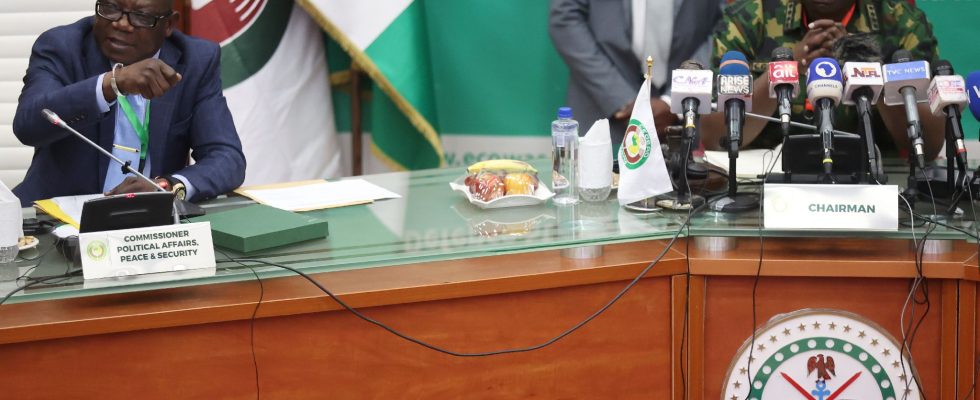The end of the ultimatum is approaching. While the leaders of the Economic Community of West African States (ECOWAS) have given until Sunday August 6 to the putschists in Niger to restore constitutional order, claiming not to exclude a “use of force “If President-elect Mohamed Bazoum is not reinstated, fear of a conflagration is growing in the region. On Monday, the juntas of Mali and neighboring Burkina Faso, themselves coming to power after a coup in 2021 and 2022, increased the pressure. “Any military intervention against Niger would amount to a declaration of war” against their countries, they warned in a joint statement, threatening to adopt “self-defense measures” in support of its “brother Niger”.
Psychological blackmail or real threat? Difficult, for the moment, to know if the strong men of Ouagadougou and Bamako will transform their words into deeds. According Young Africa, soldiers from the National Council for the Safeguarding of the Homeland (CNSP), the junta that overthrew President Bazoum, traveled to Bamako on Wednesday to meet their allies. At the same time, in the Nigerien capital, a delegation from ECOWAS was attempting a last-ditch negotiation with this same junta. While the standoff between the camp of the putschists and the West African democrats hardens, the option of a military intervention by ECOWAS to bring down General Abdourahamane Tiani is taking shape more and more seriously. The chiefs of staff of the regional organization met Wednesday, and this until August 4, in Abuja, the capital of Nigeria, to work on the different scenarios of an intervention. In this tense context, France has decided to evacuate its nationals present in Niger.
Operation difficult to implement
Does ECOWAS have the means to undertake such an operation? Which countries would agree to send its troops and in what time frame? According to several experts, in the event of failure of the negotiations, the hypothesis of an operation of a joint force, led by Nigeria, which is at the head of ECOWAS, is “credible”. “We stand for democracy and that must continue. […] We are ready and as soon as we receive the order to intervene, we will. We are absolutely sure of succeeding,” said its army chief, General Christopher Musa, on July 31. But the newly elected Nigerian president, Bola Tinubu, who has pledged to fight the contagion of coups d’etat in West Africa, does it have the means for its ambitions? “The Nigerian army is the one with the most capacity in the region, with fighter planes and drones, but it is already overwhelmed by its own insecurity and the jihadist threat on its soil. It would therefore be forced to withdraw soldiers from the field”, analyzes the American specialist Michael Shurkin, director of programs at 14 North, a consulting firm specializing in Africa. It is likely that an intervention from Nigeria, which shares more than 1,600 kilometers of borders with southern Niger, requires several weeks of preparation – as in Gambia, where ECOWAS had taken nearly a month to deploy the “Restore democracy” operation, faced with the refusal of the former President Yahya Jammeh to cede power after his defeat in the 2017 elections. Other member countries could decide to send troops, such as Senegal, Côte d’Ivoire, Benin or Ghana, all concerned about the spread of the terrorist threat in the Sahel towards their borders.
However, the consequences of a military intervention prove to be risky, as the Nigerien junta blows on the embers of sovereignty in an attempt to mobilize the crowds behind it. On Sunday July 30, thousands of his supporters demonstrated to warn the international community against the forced dismissal of General Tiani. An ECOWAS operation could crystallize the anger of the street in Niamey, and throughout the region, against the organization, already weakened and criticized, but also against France, whose speeches of condemnation are perceived by some as interference.
Risk of air call for jihadists
What if the Malian and Burkinabe juntas carry out their threat? “They should, like the Nigeriens, mobilize their most seasoned soldiers, currently engaged in the fight against terrorism, which would create a call for air for jihadist groups in the region, it would be catastrophic”, alert Tristan Guéret, analyst specialized in terrorism and Sahel issues, within the risk management firm Control Risks.
For this expert, the hypothesis of a “backlash” of loyalist soldiers or preferring to dissociate themselves from the putschists to avoid an armed confrontation cannot be excluded. “The Nigerian soldiers will not go to the confrontation, that’s for sure. Tiani could flinch, but we have to give him a way out”, abounds a senior Nigerian officer. For his part, the Nigerian president, his ultimatum issued, can hardly back down. Bola Tinubu knows that he is playing his credibility but also, and above all, the future of the region, where five coups d’etat have been perpetrated in three years.
